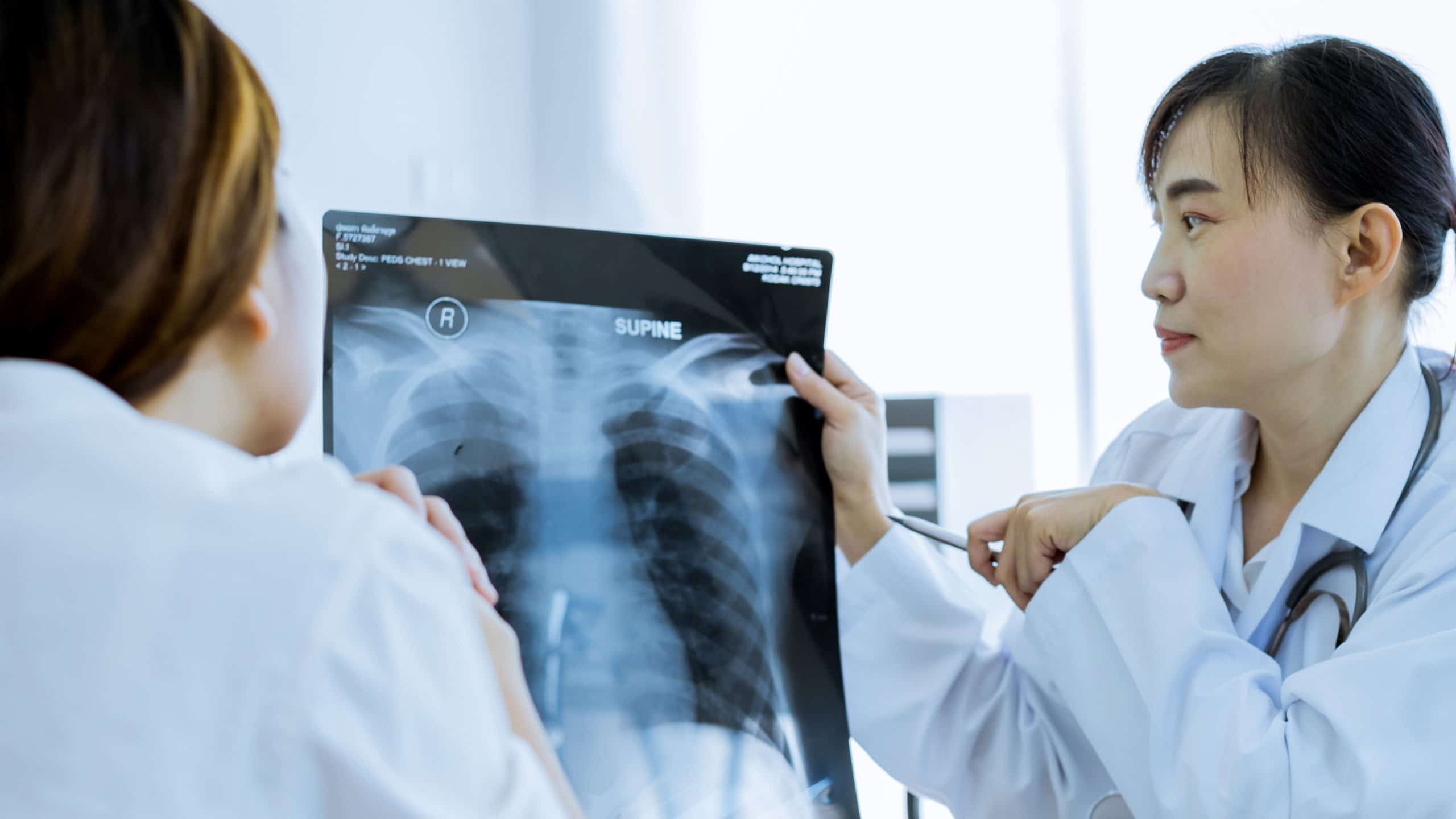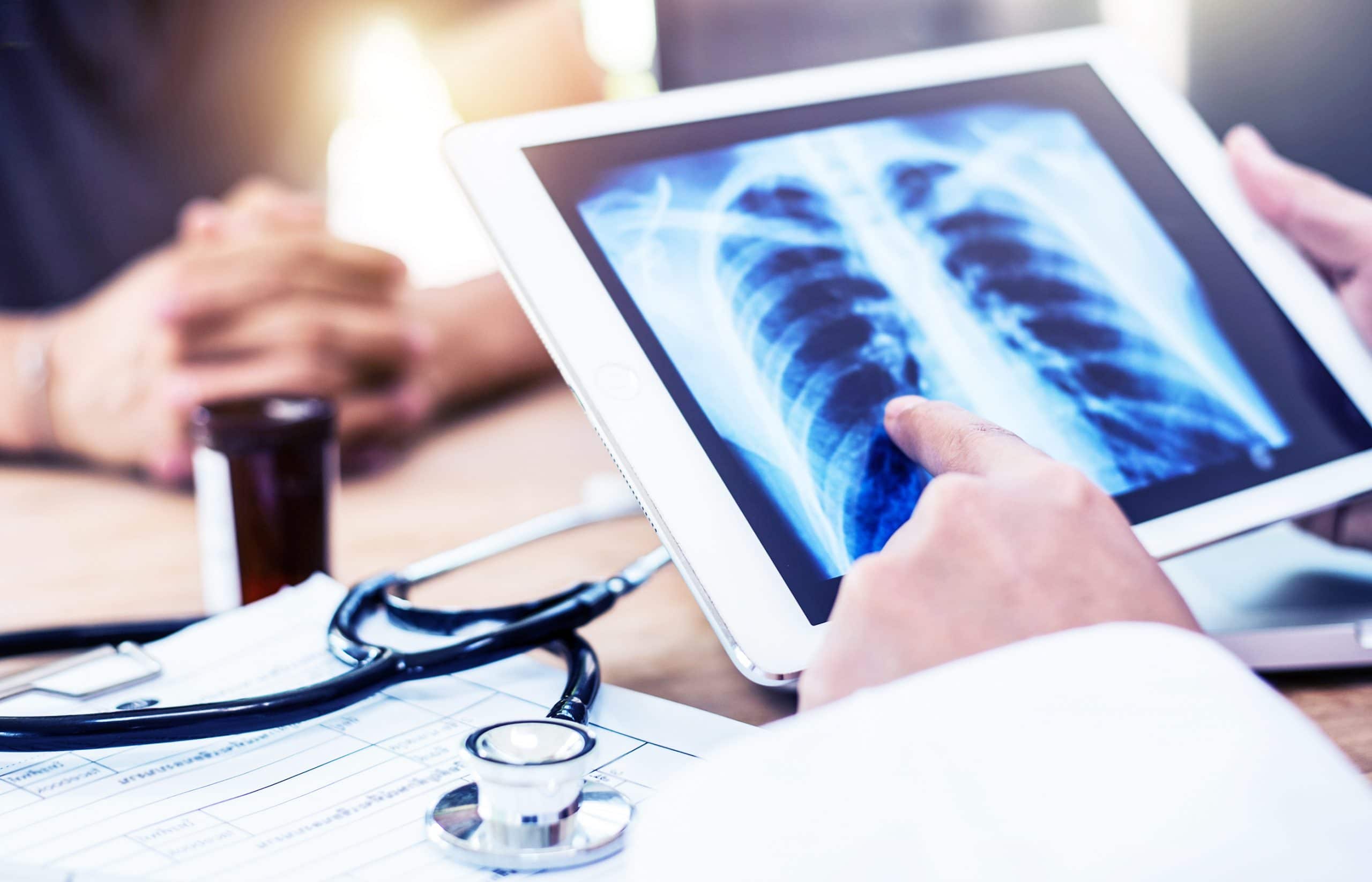Complications From Lung Cancer
Complications can arise in lung cancer patients from how cancer affects other areas of the body after it metastasizes (spreads) or during treatment. Discover other ways complications can occur.

What Are Complications?
In the medical field, complications can refer to rare or unexpected circumstances that may occur in response to another health issue or error. With lung cancer and other lung diseases, complications can arise from how malignant tumors affect other areas of the body after spreading. Besides the potential for improving a prognosis, lung cancer primary treatments and complementary and emerging therapies can come with their own range of common and complex complications as well.
Issues Associated With Lung Cancer
It’s essential to know what can happen if you develop and are treated for lung tumors. Still, the following health complications don’t arise in every patient, even ones in similar situations. Only your doctor can assess your stage of illness, general health, and other factors to better determine what lung cancer complications you, specifically, may have.
Dyspnea
Cancer is a serious medical condition that can potentially affect various parts of the body. In some cases, cancerous growths can spread and cause blockages in airways or narrow passages, leading to a condition called dyspnea. This can cause difficulty breathing and can be a significant challenge for those affected.
Hemoptysis
Nearly a quarter of hemoptysis occurrences in the U.S. are caused by lung tumors. Hemoptysis also refers to the condition of spitting or coughing up blood from the lungs or bronchial tubes. Less than 10% of hemoptysis issues are considered massive.
Horners Syndrome
Horner’s syndrome is a rare condition that can occur when tumors spread to the nerves in the neck or face. The main symptoms of Horner’s syndrome include drooping of the upper eyelid, constriction of the pupil, and reduced sweating on one side of the face. These symptoms can be alarming, but with early diagnosis and treatment, it is possible to manage the condition effectively.
Hypercalcemia
Approximately 15% of people with general cancer develop high levels of calcium in the blood. This is known as hypercalcemia. While some patients go symptomless, some develop symptoms that can include vomiting, loss of appetite, fatigue, and depression.
Hyponatremia
In some cases, lung cancer tumors can spread to the point where your body starts retaining water. When this happens, the levels of sodium in your body can drop too low, leading to a condition known as hyponatremia. Signs of hyponatremia may include confusion, tiredness, and, in rare cases, seizures. It is important to seek medical attention if you experience any of these symptoms, as hyponatremia can be a serious condition if left untreated.
Malignant Pleural Effusion
When lung tumors form, they invade the space between the lung and chest wall (pleural area) and overcrowd it. When this happens, excessive fluid can fill the space, causing an illness called pleural effusion. Pleural effusion can cause discomfort in the chest, shortness of breath, and tingling hands. There are some procedures that your doctor can perform to drain the fluid and stop it from building back up.
Pancoast’s Syndrome
When tumors affect the bundle of nerves that run from the neck to the shoulder and arms, known as the brachial plexus, it can lead to a condition called Pancoast’s syndrome. The symptoms of this condition may include numbness caused by cancer, muscle weakness, or pain in the arm or hand. It’s important to seek medical attention if you experience any of these symptoms, as early diagnosis and treatment can significantly improve outcomes.
Spinal Cord Compression (SCC)
If tumors make their way to the spinal cord and cause excessive pressure, spinal cord compression can occur. This is a medical emergency, so if you begin to feel numb in the fingers and toes, have difficulty walking, or experience incontinence, visit a hospital immediately.
Superior Vena Cava Syndrome (SCVS)
When the disease has spread too far, tumors can press against the vein, causing a blockage (SCVS), resulting in lung cancer swollen face. This complication happens in less than 3.8% of patients with lung tumors. However, you should visit a doctor immediately if you discover lung cancer face swelling, as this would be an emergency medical situation. Other symptoms include chronic coughing and shortness of breath.
Venous Thromboembolism (VTE)
When lung cancer tumors take up space and overcrowd certain areas in the body, they can cause those areas to malfunction. This can cause further health issues like blocking a vein and causing blood clots (venous thromboembolism). There are two types of venous thromboembolism. One is deep vein thrombosis (DVT), which occurs when the blood clot makes its way to a deeper vein like the leg. The second type of VTE is when the clot breaks off and heads to the lungs, also known as a pulmonary embolism. Your doctor can prescribe medications to help dissolve blood clots before they become an issue.
Complications From Lung Cancer Treatment
Sometimes, treatments can cause issues or adverse effects in a patient, but every patient’s body reacts differently. Length of treatment, dosage, stage of the disease, and general health (including history) all factor into how a patient will respond to various therapies and treatments their doctor may prescribe. Some lung cancer complications that may arise from treatment include:
Lung Toxicity
It’s important to be aware that chemotherapy treatments can sometimes lead to a condition known as lung toxicity. This condition can cause a range of symptoms, including dry cough, fever, difficulty breathing, and low levels of oxygen in the blood (known as hypoxemia).
Lymphedema
In certain medical cases, physicians may opt for the removal of lymph nodes through surgical or radiation treatment. However, one possible side effect of this post-treatment is lymphedema, which can cause painful swelling in the face due to the buildup of lymphatic fluid from a lack of circulation.
Neuropathy
One of the potential side effects of chemotherapy is peripheral neuropathy, which can manifest as a tingling or numb sensation in the hands and feet. In some cases, if the tumors have spread far enough to damage the nerves, neuropathy in the chest can also occur.
Neutropenia
Chemotherapy and radiation treatments can’t distinguish between healthy cells and cancer cells. When this happens, white blood cells and cancer cells are killed, causing neutropenia or a higher infection risk since white blood cells fight infection. Doctors can prescribe antibiotics to combat this issue.
Pneumonia
Radiation can occasionally cause upper respiratory lung infections. When one or both lungs become inflamed, pneumonia can occur. More specifically, this complication happens when the lung’s air sacs (alveoli) fill up with fluid or pus. This causes flu-like symptoms like severe cough, fever, and weakness that can last for weeks.
Next Steps
It is important to prioritize your health and well-being, especially if you are dealing with lung cancer complications. If you experience any discomfort or pain related to your illness or treatment, it is highly recommended that you contact your doctor as soon as possible. Your doctor can provide you with personalized recommendations and prescribe medications to help alleviate any symptoms you may be experiencing. Remember, seeking medical attention promptly can help improve your overall quality of life and enhance your recovery process.


